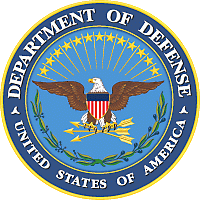You are here
Working with DoD
Sponsor-specific tools and resources for working with the Department of Defense (DoD)
 Overview of U-M Sponsored Projects with Department of Defense
Overview of U-M Sponsored Projects with Department of Defense
DoD Proposals
You may need to include, address, or reference:
- Environmental Questionnaire - Form that DoD, DoE, and EPA require from U-M Environmental Health and Safety Office (formerly OSEH)
- Information Security Requirements with:
Also see:
-
DoD PI Checklist - This checklist is intended as a resource for Investigators to ensure they are meeting the additional DoD requirements.
Navigate Training Opportunities for DoD
All DOD Agencies: Timely research reports help prevent cuts to agency funding
Timely reporting has a direct correlation to the DOD's own issuance of budget renewals. Some agencies are beginning to make university visits to highlight this issue. The Air Force Office of Scientific Research reminds grantees of this. Timely financial performance is still a pressing issue within the DoD community ... Please make sure PIs [principal investigators] are billing in a timely manner to prevent any future cuts to our Basic Research Program.
Office of Naval Research
ONR RPPR Process - A web‐based system exists for submitting Interim Progress Reports, including products (journal articles, proceedings, etc.) generated from research. The new system modernizes and streamlines processes, and implements the Research Performance Progress Report (RPPR) standard. (The RPPR standard is a government-wide effort to standardize research reporting across the entire enterprise.)
Please NOTE, the new RPPR system does not include Monthly, Quarterly or Final Progress Reports at this time. ARO has been partnering with the Office of Naval Research to develop and test the new system over the past year.
Access to the new system will be via the existing ARO Extranet, https://extranet.aro.army.mil, with a new pod entitled, “RPPR Interim Progress Reports,” using your existing userid and password. This document outlines the changes to help you familiarize yourself before deployment.
FAQs
Controlled Unclassified Information (CUI) is federal non-classified information (i.e. information the Government creates or possesses, or that an entity creates or possesses for or on behalf of the government) that requires safeguarding or dissemination controls compliant with law, regulations, and government-wide policies.
The CUI Program is a government-wide approach to creating a uniform set of requirements and information security controls directed at securing sensitive government information.
Additional Details:
For an overview of these requirements and the impact on research conducted at U-M, see U-M Office of Research (UMOR) External Funding and Information Security Requirements. UMOR’s Office of Research Ethics and Compliance provides assistance to investigators to help them understand when CUI regulations apply to research projects and to identify what U-M resources are available to meet the security requirements.
CUI requirements do not apply directly to non-federal entities, but can flow down when U-M non-federal information systems (e.g., research projects) are given access to such information by federal agencies under the terms of a contract, grant, or other agreement. U-M researchers are frequently subcontractors handling CUI on behalf of a government agency, and CUI requirements apply equally to subcontractors.
On November 4, 2010, President Barack Obama issued Executive Order 13556 “Controlled Unclassified Information” for the purpose of establishing an open and uniform program for managing [Controlled Unclassified information] that requires safeguarding or dissemination controls pursuant to laws, regulations, and government-wide policies.
Prior to this, executive departments and agencies employed ad hoc agency-specific policies, procedures, and markings to safeguard and control this information.
The National Archives and Records Administration (NARA) was designated as the Executive Agent to implement the Order and oversee agency actions to ensure compliance with this order.
NARA established a CUI Registry, an online repository for all information, guidance, policy, and requirements on handling CUI. The registry identifies all CUI categories and subcategories, provides general descriptions for each, identifies the basis for controls, establishes markings, and includes guidance on handling procedures.
There are three ways in which law, regulation or government-wide policies may permit the safeguarding or dissemination controls:
-
CUI Basic – requires or permits the agencies to control or protect the information, but provides no specific information security controls.
-
CUI Specified - requires or permits the agencies to control or protect the information, and provides specific information security controls.
-
CUI Specified, but with CUI Basic Controls - requires or permits the agencies to control or protect the information, and provides only some of the controls.
Questions?
Contact Kellie Buss with questions.